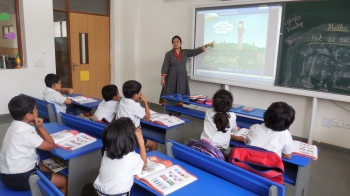
.jpg) Adv Jessy Kurian
Adv Jessy Kurian

“Private unaided schools maintaining surplus funds for development of schools is not commercialisation of education,” said Delhi High Court in a recent judgement.
“The accumulation of surplus funds is essential for the long-term sustainability and growth of the school which enables them to invest in better infrastructure, equipment, and resources. Private unaided schools may need to invest in building or improving infrastructure, such as construction of new classrooms, libraries, laboratories, sports facilities or technology upgrade such as new computers, tablets and software,” held the Bench of Justice Sanjeev Narula in “Mahavir Sr.Model School & Anr v. Directorate of Education”(2023/DHC/001866).
The fact of the case is as follows: Mahavir Sr. Model School in Delhi decided to hike fees. The Directorate of Education asserted that notwithstanding the status of “private unaided school” no fee can be fixed without their prior permission. However, the Court noted that Section 17(3) of Delhi School Education Act (DSEA) contemplates prior approval from Directorate of Education (DoE) only if the school seeks to impose fees in excess of the structure specified in statement of fees during an academic session and not otherwise. The Court also observed that the statement of fees submitted by the school to increase its fees could have been rejected if the school was found to be indulging in “Commercialisation of education”.
The unaided private schools are permitted to collect surplus fees because they are entirely dependent on the fees collected by them. They would obviously like to earmark funds for specific purposes and planning and maintaining a surplus per se cannot be construed as commercialisation of education. The right of unaided schools to determine fees to be charged from students cannot be faltered purely on account of presence of reasonable surplus in their books of account.
It can be construed as a form of commercialisation of education only when such funds are being used purely for commercial gain, rather than for improvement and development of the school.
The Court noted that commercialisation of education encompasses two elements. They are: (1) Charging of capitation fees and (2) Profiteering by the school.
On the aspect of profiteering, the audited balance sheets of private unaided schools can provide a clear and transparent picture of school’s economic status and help in assessing whether the school has sufficient resources to meet its expenses and whether a fee hike is justified.
The landmark judgement of the Supreme Court in this regard is “T.M.A Pai Foundation vs. State of Karnataka” (2002) 8 SCC 481, wherein, an eleven-judge Bench of the Supreme Court observed that the essence of private unaided institutions is the autonomy that they possess in management and administration of their affairs, and upheld the right of such institutions to set up a reasonable fee structure for betterment of amenities so that more students can take admissions.
However, Justice B.N. Kirpal struck a fine balance stating “furthermore, in setting up a reasonable fee structure, the element of profiteering is not as yet accepted in Indian conditions. The fee structure should take into consideration the need to generate funds to be utilised for the betterment and growth of the educational institution, the betterment of education in that institution and to provide facilities necessary for the benefit of the students.”
In Unnikrishnan, J.P. and Ors.v.State of Andhra Pradesh and Ors, the Supreme Court recognised the necessity of private unaided institutions to charge fee higher than Government and State-aided ones and balanced the conflicting interests by holding that the Government can impose restrictions to check levying of capitation fees, profiteering and commercialisation of education.
However, the Delhi High Court’s observation is very significant: “The primary obligation to provide education lies with the State, and it is their responsibility that every child has access to education. Participation of private unaided schools has been permitted out of necessity since the State is unable to perform its function adequately, there needs to be a collaborative effort between private unaided schools and the regulatory authorities to maintain a balance between the right to charge fees and the need for regulatory control to ensure the quality and affordability of education.”
The crux of the matter is that private unaided schools have the right to hike fees and to have surplus income. However, it must not be for profiteering and commercialisation. The surplus funds must be transparent and used for the development of schools, for the best interest of the students studying in those institutions.